
May 18, 2008
 CR Sunday Interview: Paul Maybury, Mark Andrew Smith
CR Sunday Interview: Paul Maybury, Mark Andrew Smith


*****
Aqua Leung is the latest in a thing but vital line of sprawling comics fantasies to struggle into publication the last decade or so, comics that draw on a multitude of well-established genre roots while also managing to stand out against a backdrop of more mannered, in-continuity heroic tales. It's the story of a little boy that finds out he's a lost underwater prince, which is a familiar story in a familiar setting against which the writer
Mark Andrew Smith and the artist
Paul Maybury can riff like a pair of comfortable, local neighborhood, late-night jazz musicians, piling on weirder visuals, stronger figure contrasts and more haphazard rhythms even while playing things fairly close to standard expectations in terms of the narrative outcomes. These guys were weird for me to interview because I have a limited number of questions about such material and they were interviewed to death by the various on-line comics publications. My computer also decided that this would be the time to show up for work covered in vomit and singing the banana boat song while sitting off in the corner punching itself in the face, so a lot of questions had to be sent back and forth more than once before everything was answered. I enjoyed the book, though, and I'm grateful for the patience the creators displayed in finishing up with the following.
*****
TOM SPURGEON: Aqua Leung
contains a kind of classic heroic fantasy story arc, which in comics is still a reasonably rare thing. Can you track for me some of the direct -- and indirect -- inspirations and precursors to the project? Are there are any stories for which your aspirations concerning Aqua Leung
include similar success or comparable excellence in its execution? Are there any comics published in the last decade you'd consider fellow travelers?
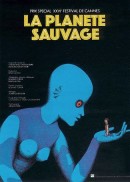 PAUL MAYBURY:
PAUL MAYBURY: When I was little, in the '80s, my parents would rent me animated movies from the local video store. I guess in that store's opinion anything animated obviously belonged in the kids section. So I ended up watching movies like
Heavy Metal,
Wizards,
Grendel Grendel Grendel,
Fantastic Planet,
Light Years, etc. Just a lot of movies with adult themes and pretty scary characters. I ate this up as a kid, and I wanted to do a book that had inviting cartoonish-looking characters with a much heavier setting and tone. Kind of a kids book with teeth.
I try not to look to comic books for my inspiration too much, but I will say that
Bone is something that kept popping up in my mind while working on
Aqua, as a quality level to aspire to. I also think I started working on
Aqua around the same time Mike Oeming got to work on
Mice Templar and I think the two series share this same kind of enthusiasm for modern comics fantasy.
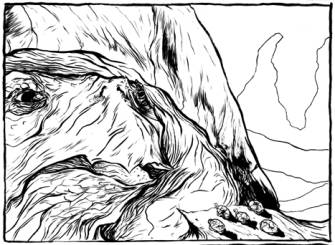 SPURGEON: Two works it reminds me of far more than Oeming's are Frank Espinosa's
SPURGEON: Two works it reminds me of far more than Oeming's are Frank Espinosa's Rocketo
and even the first few volumes of Dragon Ball
, given the young protagonist and the wildly stylized design. Did either of those books inform what you guys were doing? Where in general did you find inspiration for the designs?
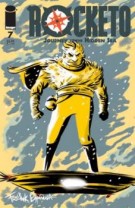 MARK ANDREW SMITH:
MARK ANDREW SMITH: I was a bit freaked out by
Rocketo as well hearing that it was an underwater book. But I think overall just the first book of
Rocketo took place underwater for the setting. Meeting Frank at cons he's very nice and supportive and always really warm. But I was a bit worried while we were working on
Aqua and then seeing
Rocketo and it was stressful for me a bit, but they turned out to both be unique and completely different. As a kid I always liked the concepts of
Dragon Ball but I was unable to get into it as a show and actually watch it because there were so many characters, so I liked the concepts, but I was always like "what the hell is going on?" and I could never get into watching the show.
MAYBURY: That's funny, because I remember picking up Frank's
Rocketo #0 from Speakeasy in San Diego in 2005 right when I was starting
Aqua Leung. I was excited by it but at the same time freaked out and thinking that I at least needed to live up to a comic like this visually. So it probably pushed me artistically for sure. I'm originally from Boston, and Frank ended up teaching at MIT for a bit, so I remember going to Mr. Bartley's hamburgers with him and having a good discussion about comics and
Aqua. I even did a pinup for the second trade a while back. He's totally Spiro by the way.
I've always been a big fan of Akira Toriyama's art and design. I think I got into Manga and Anime fairly early in the 90's, so I remember having the Japanese versions of the first few volumes of
Dragonball.
TOM SPURGEON: Can you talk a bit, in as explicit terms as possible, about your character designs for the book? What kind of process was involved -- was it done separately or in the process of making the comic? How much collaboration was there on the look of individual characters? Where did you go for inspiration on individual designs? Was there any trial and error involved? Is there one character that specifically pleases either of you?
MAYBURY: Mark had drawn up a bunch of sketches of stuff he might want to see in the book and mailed them to me. I admit to losing them right after I got them and didn't find them for almost a year tucked away in a box or something as if to say, "Paul, move your stuff." Looking back at them now, Mark and I had a pretty similar vision for Aqua and his father.
With
Aqua Leung I wanted to capture the Saturday morning cartoon action fun that Mark was all about, so I think I originally pulled from
Astro Boy in look, but I wanted to bring in a darker heavier tone and give it sort of a different aesthetic. I almost wanted it to have a
Heavy Metal magazine type of vibe, which I tried to get across in the logo. When I drew up my ideas for the logo I told Steven it should be a combination of
Star Wars,
Slayer and
Spartacus, which actually kept running through my head for the entire book. I think Mark really trusted me to come up with whatever for the book while throwing me some ideas here and there. So, I had complete creative control right down to colors.
There were even a couple ideas which Mark was not too fond of but I kind of stuck to my guns and just asked him to trust me. For instance, Nero the crab king having smaller arms in the front. I remember drawing those in, then writing in a couple ideas for scenes to set up his reveal shot coming out of his tent, and then later on the punching sequence when Aqua confronts him. In fact that whole confrontation scene was written, drawn and colored independently for an early previews submission way before we even got to talking about that last part of the book. I think I had one night to do it all since it was a last second thing, so I got to really take the design out for a test drive and come up with some pretty cool (at the time undecided) color schemes and flesh it all out. Mark got to see this fully realized version of it early and I think he ended up really liking that extra character design element and how it really added to the story rather than just looking cool. Out of all the characters in the book I think Ragged Tooth and the Ice Archer are my favorite designs from costume to color.
SPURGEON: Comics and cartoons set underwater used to be a real staple of those forms of entertainment, and I'd say they're much less so today. Do you have any suggestions as to why?
MAYBURY: I think the genre was just done to death, and never had anything really flip it upside down. I think it was like eating vanilla ice cream for years, and we came and brought Oreos to the mix. Now the genre is tasty again, but it's still got the vanilla we all love and we remember why we love it. Volume 2 is going to bring the fudge.
ANDREW SMITH: Underwater books are not a genre yet I'd argue. They're a setting and a background for a style of genre story to take place. I think for most people it just never crosses their minds to do an underwater book or no one is brave enough to actually go through with it and figure it out. Their attention usually turns to a hundred other types of genres first and underwater isn't so much a genre with conventions as much as it is a setting.
It's very easy to get lot in the trappings and figuring out how it all works instead of telling the story. With
Aqua Leung, it's really about the character first and foremost and his journey before it's an underwater book. It's a huge and epic fantasy story as well and huge action book before it's an underwater book and a bit of a genre blender with very classic storytelling roots
 SPURGEON: Was drawing on that general tradition, say, a help for you? Was it appealing for you to work in an area of fantasy that's under-utilized right now?
SPURGEON: Was drawing on that general tradition, say, a help for you? Was it appealing for you to work in an area of fantasy that's under-utilized right now?
ANDREW SMITH: We didn't really draw on the tradition too much of the underwater world but we did draw quite a bit from the well of fantasy.
Aqua's a very classic book if you read it with classic themes. It's not done that much these days, so it's really reaching back into the past and drawing upon the well of things that we grew up with and enjoyed greatly.
MAYBURY: I think it helps establish something without us spending too much time to paint a background. I mean, we still felt obligated to give you the traditional hero background to make it a classic character, and use the underwater vibe the way it's been done in the past to a point. But, now, in the next volumes it's going to be a swift departure story wise. We have that hero that you all know, and we can do all the stuff we wanted to see previous characters of the genre go and do.
 SPURGEON: Can you talk a bit about the decision to do an OGN, and to do it through Image? For instance, can you give an example or two of how you work with that company -- are you able to get feedback, or you able to get advice on marketing, or even support? How do you not get lost in the wave of work that's coming from that publisher right now?
SPURGEON: Can you talk a bit about the decision to do an OGN, and to do it through Image? For instance, can you give an example or two of how you work with that company -- are you able to get feedback, or you able to get advice on marketing, or even support? How do you not get lost in the wave of work that's coming from that publisher right now?
ANDREW SMITH: When we began
Aqua Leung we stared off doing single issues but as a habit I always pack single issues to 32 pages of full story just because that's something I really like and I feel guilty if even a single page in a comic is left unfilled with story. Paul showed some of the pages early on to Image and they saw that we were doing a bit of a
Geof Darrow with many of the splash pages in the book and said it would work better as an OGN. That's the best thing that ever happened to us. We didn't have to worry about fitting everything in and we could really stretch and pull the story in the parts where we wanted to. The OGN is a beautiful, beautiful, format to work in.
MAYBURY: Self marketing is key with Image. Joe [Keatinge] is great, he does what he can but he's just one guy doing marketing for Image. Mark and I are in different time zones. So I'm up promoting the book while he sleeps, then when I'm sleeping Mark is up doing the same. We have Joe to help fill in the gaps, and he has a lot of connections that we just don't have. I think a lot of Image creators make the mistake of thinking their job is done once the hand in the book.
ANDREW SMITH: We can get feedback at Image but usually I'm a big chicken and sort of hide out from the bigger guys like
[Erik] Larsen and
[Eric] Stephenson. So I usually keep out of sight and just work and then let them see the finished product. I grew up when I was a kid reading Erik Larsen's book so it freaked me out a bit every time I would talk to him because when I was young I'd walk a few miles to the comic shop with whatever money I had to go and buy his book when Image was starting out.
So in a way I'm one of those Children of Image characters like
[Robert] Kirkman that grew up and started creating comics. These days I'm much better about talking to Erik Larsen and less of a chicken. But at first it was surreal and strange for me.
With
Aqua Leung they trusted us completely and that was a great feeling. So we didn't get feedback too much and when we were finished we were like "Okay, here's the book we've been working on for two years," and we dropped it in their laps.
A few years ago when I started with
Amazing Joy Buzzards it was hard to get help and support on marketing but now with Joe Keatinge at Image he's really trying very hard to market and they get that we work so hard on these books and that they need to be promoted. These days were having good attention paid to us and the improvement has been tremendous in marketing from where it was a few years ago.
There are a lot of books that come out from Image every month and you get help with promotion from the publisher but it's really up to the creators to promote and sell their books to the public at Image. I think in comics there's a real defeated attitude in Indy books but Paul and I will tell you that hard work and picking your right targets for press pays off. I think many creators get an interview on a site and then they think that their work is done. Promotion is just exhausting and it feels like banging your head up against a wall. It's more exhausting than the creation of a work of art. But it's necessary. I know there's the whole introverted and tortured artist stereotype for folks in comics but Paul and I for comic book people are really extroverts and promoters as well as creators.
So Paul and I would have none of it and our feeling was that we had done too much work on
Aqua Leung not to promote it in every way we knew how to do. We gave promotion and interview our all and it paid off.
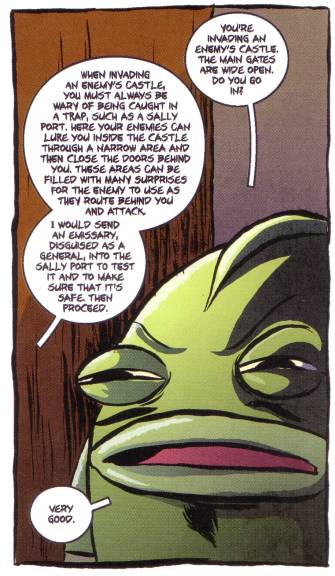 SPURGEON: What do you have to sell to break even? Do you anticipate on making money with this work? Are there ancillary benefits outside of profiting with a single work, such as film rights and laying a foundation for future gigs, that are part of your motivation in doing a project like this one? How important is it to you that your comics are successful in that way?
SPURGEON: What do you have to sell to break even? Do you anticipate on making money with this work? Are there ancillary benefits outside of profiting with a single work, such as film rights and laying a foundation for future gigs, that are part of your motivation in doing a project like this one? How important is it to you that your comics are successful in that way?
MAYBURY: Well, we're doing a lot better than we thought we would. So we're in a good place at the moment. For Mark I'm sure it's different, but for me it's a door opener. So I can't really lose off this project because I got to do what I wanted to do, and I got my name out there and there's a second book on the way to correct any mistakes as a story teller and artist I made on volume 1.
ANDREW SMITH: We're past our break-even mark now so now if we're selling copies of the book it's money that we get to keep. There's not that much of a reward though for just how time consuming comics are. It's a unique industry because everyone is creating comics out of the side because of their love of the medium and not money. So when we sell through our print run the amount of cash that Paul and I get to keep between ourselves is really laughable. That's not really our motivation or our goal setting out.
A future gig isn't my motivation for doing
Aqua Leung. I like creating my own work I'd like to do a few new books every year and be sort of like an Independent
Stan Lee outside of that company system. If they called and offered me a job I'd probably do it just to try it on for size and to see if my audience would follow me onto my own work that I own.
Film rights are probably the only place for
Aqua Leung right now where there would be a reward and that would be really nice if it happened and we're taking a ton of calls right now and working hard on getting it setup. If it went through I could quit my job and go to Costa Rica for a year or two and work on comics full time. That's the reward, it's not money, it's to facilitate doing comics full time. So money is just the avenue and a means to doing comics all the time.
I think for us it's important that we have a readership that knows who we are and that follows us from project to project as we build more and more of an audience that follows our work. It's extremely important. Paul and I both came into
Aqua Leung with a bit of a built in audience, for Paul it was from
Act-I-Vate and
Zuda, and for myself I have an audience with
Amazing Joy Buzzards. So it's really about building and building more and more on foundations that are already there.
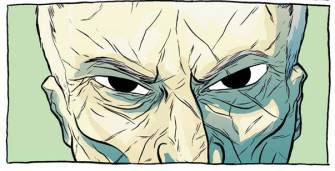 SPURGEON: You've done a ton of promotion for this material. Is there any danger to doing a lot of interviews, a lot of articles about a work? Do you think interviews and the like result directly sales or is there a more general effect of exposure and kind of raising your creative profiles? Where do each of you stand on the utility of convention appearances?
SPURGEON: You've done a ton of promotion for this material. Is there any danger to doing a lot of interviews, a lot of articles about a work? Do you think interviews and the like result directly sales or is there a more general effect of exposure and kind of raising your creative profiles? Where do each of you stand on the utility of convention appearances?
ANDREW SMITH: I think that all press is positive and good press. I can't feel guilty about doing press and I don't feel that doing a ton of press makes us any less independent as a book.
Aqua Leung is a weird hybrid of a book where folks aren't sure what to make of it or where it fits in as a color OGN.
MAYBURY: Well, there's only about a couple months of solid promotion, and it's mostly for retailers or anyone with a genuine interest in the project or us. I think since we were kicking off such an ambitious project it was important to get enough of a bang behind it, just to lift it off the ground, then the word of mouth can carry it the rest of the way while we create the next volume. I'm on a solo mission to promote the book convention wise, as Mark is in Korea.
ANDREW SMITH: We're a bit of the ugly duckling. Are we a duck or a swan? I'm not sure. I think in the next few years the lines will become more and more blurred and many more walls will break down with the perception of what's Indy and in between.
Exposure is wonderful and people reading your work and picking it up is wonderful and well deserved. It absolutely raises our creative profiles and that's very nice.
I've been living in South Korea for the past two years so I haven't done any conventions in a while, but Paul does quite a bit. I think those are good and I loved being at San Diego for
Comic-Con because it's such a whirlwind experience for five days when all of your favorite people are in one area. I think heaven must be a bit like that where all your favorite folks are around and you get to hang out with them all the time.
 SPURGEON: Paul, what is it that appeals to you about some of the newer European cartoonists like Blutch and [Christophe] Blain? For both of you, does the rigidity of American comics when it comes to styles and genre and format ever bother you? Could the industry be changed in a way that would better suit what you want to do with your work overall?
SPURGEON: Paul, what is it that appeals to you about some of the newer European cartoonists like Blutch and [Christophe] Blain? For both of you, does the rigidity of American comics when it comes to styles and genre and format ever bother you? Could the industry be changed in a way that would better suit what you want to do with your work overall?
MAYBURY: I think for me, I had a really hard time figuring out who I was as a comic book artist. I'm a painter, and I have a sort of strange street level art education that just didn't involve a lot of mainstream comics. I'm a younger guy, so I always loved the "alternative" stuff like
Milk & Cheese, etc. I was also a huge fan of
The Maxx by Sam Kieth, and it really just shaped my idea of what a comic was. I spent a bit of time trying to
draw like Jim Lee and his peers and I just never really enjoyed the process. I don't want to be a penciller, I don't want to just do inks over someone else. I want it all, and I want to feel like I'm still making a work of art on each page that appeals to me in the same sense of what I feel about looking at
[Jean-Michel] Basquiat (Not comparing my art to his). I want to feel like I can frame each page, sign it and hang it in my living room and truly value it as a stand alone piece. I get that excitement and appreciation from a lot of the newer European artists. When I look at their work, I see beautiful compositions, lush inks and often brilliant simple color schemes. Following their foot steps makes this fun and rewarding for me. So maybe this isn't how everyone feels, but for me and I know a lot of other people, the popular American mold just wasn't for me.
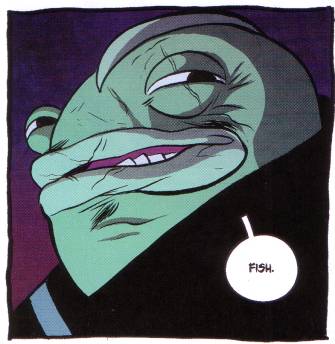 SPURGEON: One more for Paul: did you really do the last 60 pages in about a month? What is it that changed that allowed you to work at that rate of speed, and is there a quality to the resulting work that you think comes out of working that quickly that you like or dislike?
SPURGEON: One more for Paul: did you really do the last 60 pages in about a month? What is it that changed that allowed you to work at that rate of speed, and is there a quality to the resulting work that you think comes out of working that quickly that you like or dislike?
MAYBURY: Yeah, everyone makes fun of me for talking about it, but it is true. I was just pulling so many hours at work, dealing with a hellish land lord situation and generally miserable for a long time. My girlfriend and I packed it up, moved to Austin and I left my job. It was that endless free time to work that just kind of set me off creatively. I was also wanting to release the book about a month earlier to help promote it for some of the bigger cons and have time to still sit and email and promote from home. I also had to keep in mind that I'm involved with making sure the colors are right, and that the editing for the scripts was tight before they went to letters. So I just sat down every day seven days a week and just finished this book that had been laying around for almost three years. I wanted it done, I wanted to move on, so I was very motivated.
SPURGEON: For the both of you: do you find that heroic adventure stories of the kind you're doing have value as moral instruction, or a way to get at themes on how to conduct oneself successfully in the world? What might a kid in particular take away from the way this story has unfolded so far? Are you concerned with theme and message; is that something you craft as judiciously as the other elements of a work?
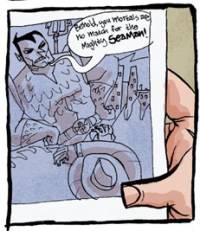 ANDREW SMITH:
ANDREW SMITH: I think they do have value as moral instruction, but we didn't start of with the moral, and the morals in many ways reveal themselves to us as the story unfolds. I don't think anyone should mirror
Aqua Leung as a mentor because he's going to grow up into an evil bastard of a man but readers will identify with him a lot. But there is still something to be said that people can learn from watching him as in a Shakespearian play. Themes are very important but in creating they're something that we discover as we craft and form the story. So kids shouldn't try to be Aqua but they should learn from him as a character and from his faults.
MAYBURY: I know this is a bad answer, but I'm not worried about it. I feel like a kid should be able to read something that might be a negative message, or the wrong thing to do. I think a good parent will let their child understand a work of fiction. Not everything you see is what you should be doing, and TV and literature isn't always a learning tool and isn't some sort of indisputable "truth"/Fox News. If there's any message in
Aqua, I think it will simply be that a child is a product of their environment, and even a sweet kid growing up surrounded by glorified war can grow into something terrible without proper guidance. So maybe this is more of a book for parents, I don't know. But again, I don't want the book to preach, I just want it to be entertainment.
SPURGEON: Is is possible to write a story like this without it being critical of the genre or type of story that you're writing? For instance, there's a lot of foreboding about becoming too locked into one's ways in Aqua Leung
; at the same time you have this classic heroic quest taking place. Do either of you think in terms of tweaking classic story structure via deconstruction, or do you consider yourself more straight-ahead storytellers?
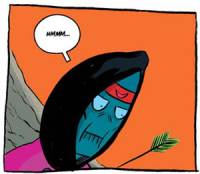 ANDREW SMITH:
ANDREW SMITH: It's very possible. I had dinner with another comic artist a few years ago and he gave me the best piece of advice I'd ever gotten. He said, "Don't worry about something being similar to another thing or that there is already something out that's like it or stepping on any toes. If everyone went "That's been done, I can't do it, there would be no new works of art." Embrace it and pull the best things forward and out of those and shoot past them and make them better than what came before. It's easy to get caught up in the done that before thing as a creator."
I'm not critical of the genre too much, I think the goal is to set out to do a book that's entertaining for us to work on and a bit experimental as well for us so it's a journey of discovery as we're creating the work. We don't think in terms of deconstructing or tweaking classic story structure. I don't think we're straight ahead storytellers at all either. So I think it's more of something that we're in the middle of it but we haven't thought about how it works or why it works or picked it apart too much yet. We just charge in and create and don't give much thought as to the classifications or implications of what we're doing. In a way it's pure selfishness and we're making something that we're just having fun on. So the rule is fun and to do a lot of cool stuff in a book. I think we work and we're blissfully unaware of the names for what we're doing, we just do it because it feels natural.
MAYBURY: I think the point of
Aqua is really just two nerds sitting around saying, "Hey, didn't you always want (insert underwater dude) to really just punch a dolphin in the face and blow something up with a laser?" I think people tend to get too realistic and cookie cutter when it comes to fantasy, and they're forgetting to, well... fantasize. So for me the mold that we used to make Aqua was necessary for us to kind of redo it in the enthusiasm we would have done it when we were kids, but with the talent and and real world skills to put it out and make it happen as adults. So if you can understand that we love the genre, and we want to use it to just take it a few steps to the left, and actually see what would have happened if the story just got a little more out there to see if people were thinking or wanting the same thing we were.
*****
* cover
*
Fantastic Planet poster
*
Rocketo
* various panels and pages from
Aqua Leung
*****
*
Aqua Leung Vol. 1, Mark Smith, Paul Maybury, Image, softcover, 160 pages, 9781582408637 (ISBN13), April 2008, $19.99.
*****
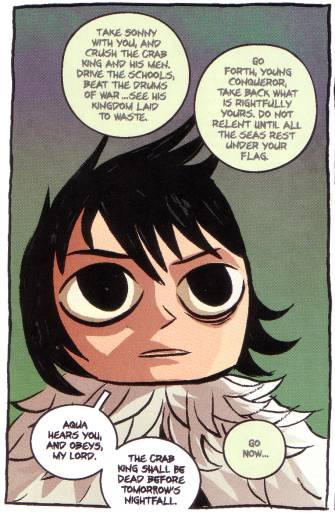
*****
*****
posted 8:00 am PST |
Permalink
Daily Blog Archives
November 2019
October 2019
September 2019
August 2019
July 2019
Full Archives


